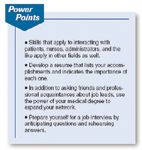Article
Taking your medical degree in a new direction
If you're thinking about leaving your practice, you can still put your skills to good use.

Long a part-time academic, Grossman ultimately moved to Tallahassee to become a teacher and the director of career development at the Florida State University College of Medicine soon after the college welcomed its first class in 2001. He enjoyed the work and the interaction with aspiring physicians, but in 2004 an Ohio hospice made him an offer he couldn't refuse.
"During my years as a clinician, I served as a volunteer medical director for Hospice of the Valley in Boardman, which I had helped to organize," he says. "When the hospice began planning an inpatient facility, I was hired as full-time medical director. The hospice's board was looking for someone who was comfortable making home visits and had a holistic view of patient care." Additionally, Grossman felt he could bring more to the job than someone who hadn't viewed end-of-life care as closely and as personally as he had.
Nonclinical fields where a medical degree comes in handy are numerous and varied. In addition to opportunities in pharmaceuticals, insurance, utilization review, biotechnology, health systems, risk management, occupational health, and academia, physicians can earn a living as consultants, lecturers, and writers. Indeed, Robert F. Priddy, executive director of PhysicianCareerNetwork in Englewood, CO, maintains that physicians who apply for a nonclinical medical job have a leg up on the competition. "You can reasonably tell a potential employer, 'I meet all your needs, plus I have a medical degree.' "
Still, going from an exam room to a classroom or boardroom is risky, because often it means starting over, and putting aside skills that were learned at great expense. It also means developing a network, writing a resume, and being interrogated by interviewers. And in many cases it means less income-at least initially, while you're getting established.
Here's how some of your colleagues retooled their work life, and what they and career counselors say about the nonclinical job market.
Exploiting talents you had all along
Not surprisingly, physicians who take up a nonclinical line of work make use of abilities they developed prior to or during their clinical days. Before physical medicine and rehabilitation specialist Marilee Sipski became senior vice president and chief medical officer for CHN Solutions, a managed care organization in Hamilton, NJ, she did committee work, was director of outpatient services, and set up clinical programs-in addition to seeing patients-at Gaylord Hos pital in Wallingford, CT.
In 1997, after Sipski be-came a part-time consultant to develop a workers' compensation product for CHN, she began taking courses through the American College of Physician Executives. She now heads several departments, including medical advisory, credentialing, quality, and utilization management. "This position has given me a tremendous opportunity to use my perspective as a physician to participate in another arena of healthcare," she says.
Physician career migrations can be swift or incremental. Some examples:





